Trump Stubs His Toe on Crimea, a Political Football for Centuries | The New York Sun
The Crimea Conflict: A Historical Overview
The article delves into the complex history of Crimea, a strategically important peninsula that has been controlled by various empires for millennia, including Scythians, Goths, Greeks, Romans, Mongols, Venetians, Ottomans, Soviets, Nazi Germans, and currently, Russia.
Trump's Stance and Ukrainian Resistance
President Trump's suggested peace plan, involving Ukraine and the US recognizing Russia's 2014 annexation of Crimea, is met with staunch resistance from Ukrainian President Zelensky. Zelensky insists that Crimea is Ukrainian territory and non-negotiable.
Geopolitical Significance of Crimea
Crimea's strategic importance lies in its location on the Black Sea, allowing the controlling power to project force across the region. Control over Crimea also impacts access to Ukrainian ports and the mouth of the Dnipro River.
- Russia's annexation of Crimea provided a significant boost to Putin's approval ratings.
- The annexation led to a large influx of Russians into Crimea and the displacement of Ukrainians, including many Crimean Tatars.
International Condemnation and Future Uncertainties
Numerous countries, including the US, refuse to recognize Russia's claim on Crimea. The article suggests a potential 'Korean-style' solution where both sides agree to disagree, leaving the ownership question unresolved. The article concludes with concerns about Trump's envoy meeting with Putin, highlighting the uncertain future of Crimea's status.
Searching for a Russia-Ukraine peace deal, President Trump is stumbling over a prime piece of beach real estate that has been disputed for 2,500 years. Slightly larger than New Jersey, Crimea has been occupied, successively, by Scythians, Goths, Greeks, Romans, Mongols, Venetians, Ottomans, Soviets, Nazi Germans, Ukrainians, and, most recently, Russians.
In the early modern era, it gave its name to a war, the Crimean War of 1853-1856. Britain, France, Turkey, and Sardinia beat Tsarist Russia. Today, this arid peninsula of beach umbrellas, submarine bases, and Greek ruins is once again the focus of international intrigue.
News stories cascade out of Washington saying that a Trump-orchestrated peace plan stipulates that Ukraine and the United States recognize Russia’s 2014 annexation of Crimea. In response, President Zelensky told reporters Tuesday: “Ukraine will not recognize the occupation of Crimea. It’s our territory, the territory of the people of Ukraine, there is nothing to discuss here.”
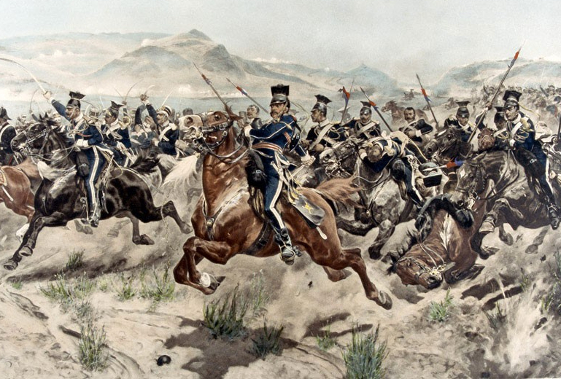 An episode of the Crimean War, ‘The Charge of the Light Brigade,’ detail, by Richard Caton Woodville Jr., 1894. Via Wikimedia Commons
An episode of the Crimean War, ‘The Charge of the Light Brigade,’ detail, by Richard Caton Woodville Jr., 1894. Via Wikimedia CommonsYesterday, Mr. Zelensky posted an American statement from Mr. Trump’s first term as president. It proclaimed: “The United States rejects Russia’s attempted annexation of Crimea and pledges to maintain this policy until Ukraine’s territorial integrity is restored.” Perhaps to punctuate Kyiv’s claims, Ukrainian drones reportedly hit military targets in nine Crimean localities last night.
In response, Mr. Trump posted yesterday on Truth Social: “It’s inflammatory statements like Zelenskyy’s that makes it so difficult to settle this War.” The American president taunted: “If he wants Crimea, why didn’t they fight for it eleven years ago when it was handed over to Russia without a shot being fired?” He added that Ukraine lost Crimea long ago and it “is not even a point of discussion.”
To give the Ukrainians a nudge, Russia unleashed this morning the largest ballistic missile attack of the war on Kyiv. Hitting high-rise apartment blocks, the rockets killed eight and wounded more than 70 people, according to Reuters.
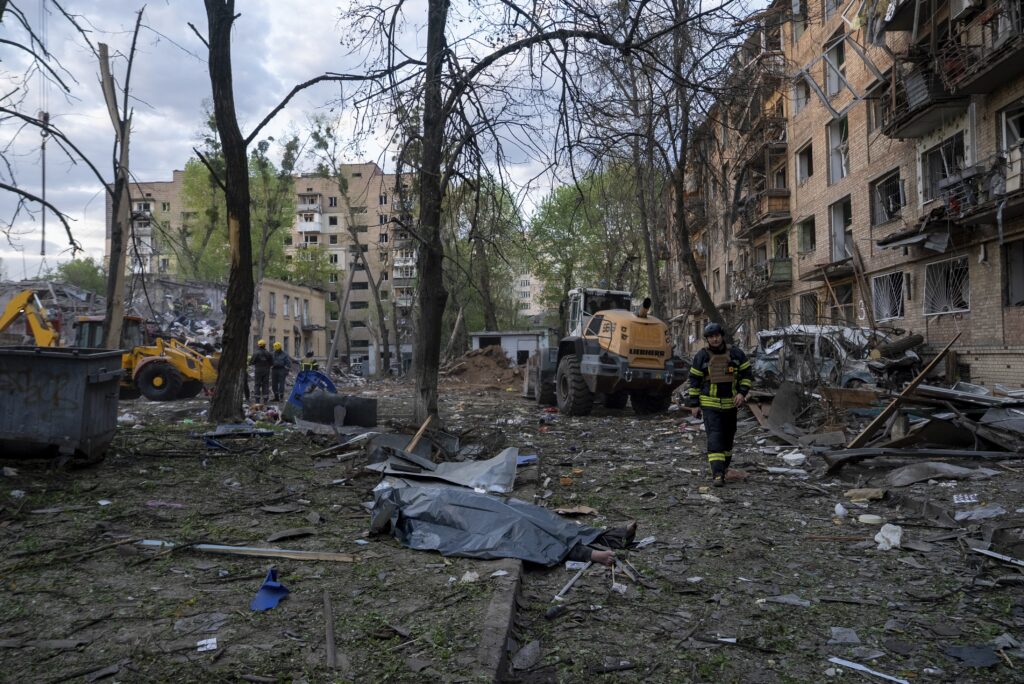 The aftermath of a Russian strike at a residential neighborhood at Kyiv, April 24, 2025. AP/Alex Babenko
The aftermath of a Russian strike at a residential neighborhood at Kyiv, April 24, 2025. AP/Alex BabenkoGeopolitics and economics dictate why Crimea has been a strategic prize for empires for two millennia. Jutting south into the Black Sea, Crimea is today a land-based aircraft carrier for Russia. Whoever controls Crimea can project force around the Black Sea, to the Balkans, and to the Eastern Mediterranean. Control of Crimea enables Russia to exercise veto power over Ukraine’s Odessa ports and the mouth of the Dnipro River, Ukraine’s Mississippi.
Alluding to Crimea’s strategic value, the European Union foreign policy chief, Kaja Kallas, said this week: “The EU will never recognize Crimea as Russian. Crimea is Ukraine.”
Ever since Catherine the Great incorporated Crimea into Tsarist Russia in 1783, Crimea has hosted at Sevastopol the headquarters of the Russian navy’s Black Sea Fleet. In 1954, the Soviet premier, Nikita Khrushchev, transferred control of the peninsula to Ukraine from Russia.
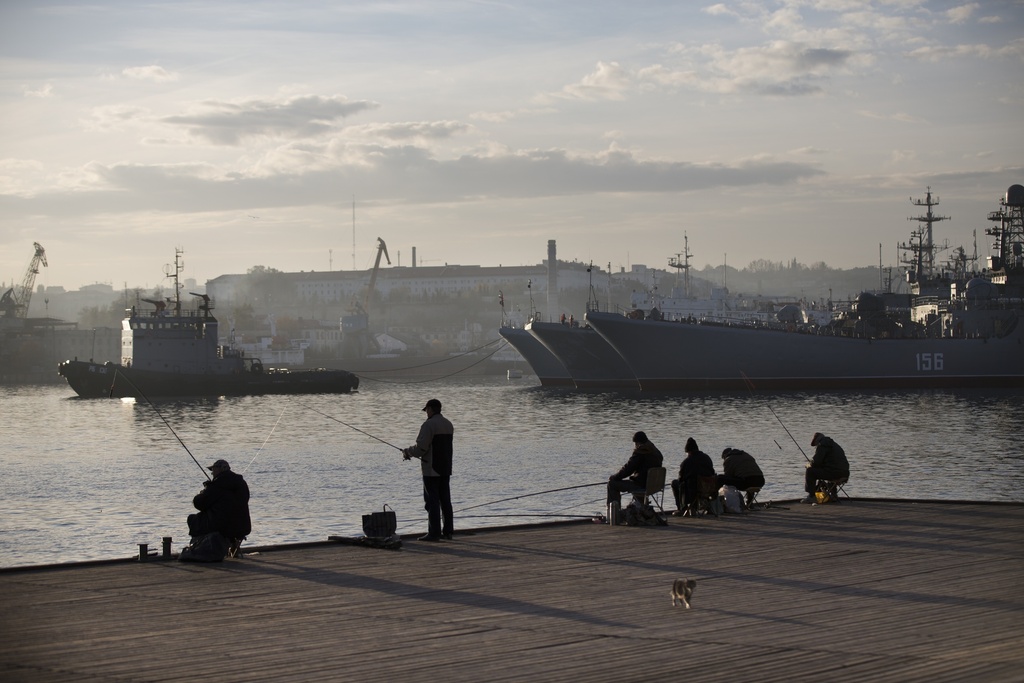 Russian navy ships at Sevastopol, Crimea, in 2014. AP/file
Russian navy ships at Sevastopol, Crimea, in 2014. AP/fileThis was largely administrative as both “republics” were integral parts of the Soviet Union. With the peninsula connected to Ukraine’s mainland by two land bridges, the transfer made sense due to road, rail, power, and water links.
Long a prized southern possession of the Soviet empire, Crimea today is overwhelmingly Russian-speaking. In 1991, when Ukrainian independence came up for a referendum vote, support in Crimea was lukewarm — 54 percent voted in favor across Crimea and 57 percent at Sevastopol city. Nationally the total was 90 percent in favor.
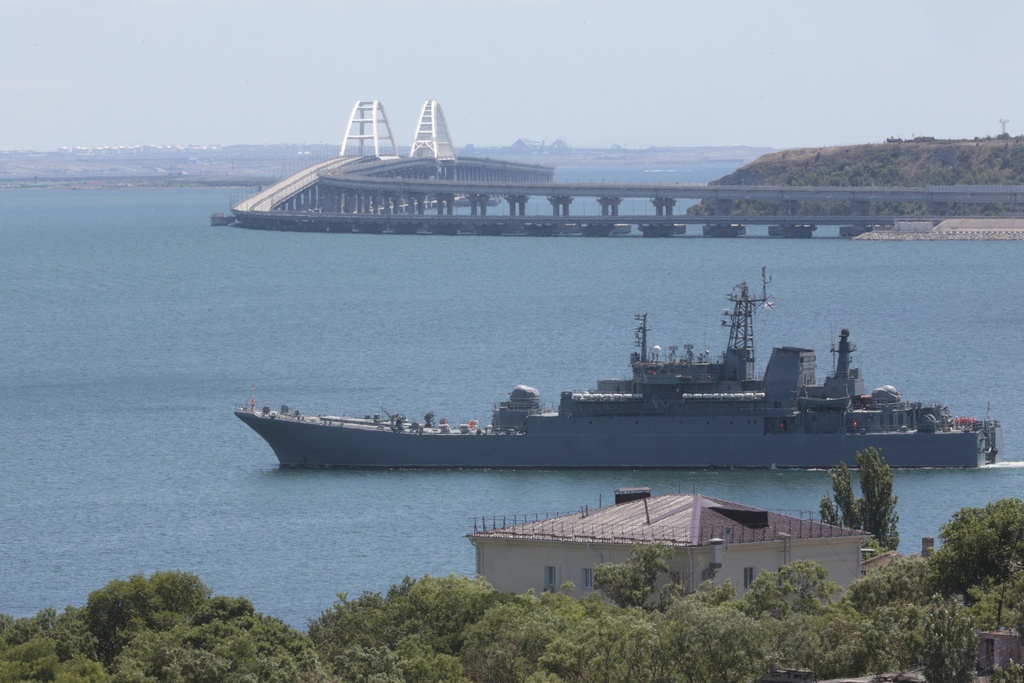 A Russian military landing ship sails near Kerch, Crimea, on July 17, 2023. AP, file
A Russian military landing ship sails near Kerch, Crimea, on July 17, 2023. AP, fileUnder a lease, Russia retained basing rights for its surface and submarine fleet at Sevastopol, and Russia’s huge naval presence there once made America’s naval base at Guantanamo, Cuba look like Camp Swampy. In March 2014, when President Putin annexed Crimea, only six people lost their lives. About two-thirds of Ukraine’s navy sailors and almost all of Ukraine’s navy fleet defected to Russia.
Wildly popular in Russia, the annexation of Crimea boosted Mr. Putin’s public approval ratings to a 25-year high of 89 percent. Over the next decade an estimated 800,000 Russians moved to Crimea, largely for military jobs or to retire to a balmy climate.
Conversely, Ukrainians mourned loss of control of their southernmost territory. About 100,000 people left the peninsula for mainland Ukraine. Many were Crimean Tatars, the Turkic minority that historically inhabited the area. In exile, Crimean Tatars opened popular restaurants across Ukraine. The group became a pillar of support for Mr. Zelensky’s government.
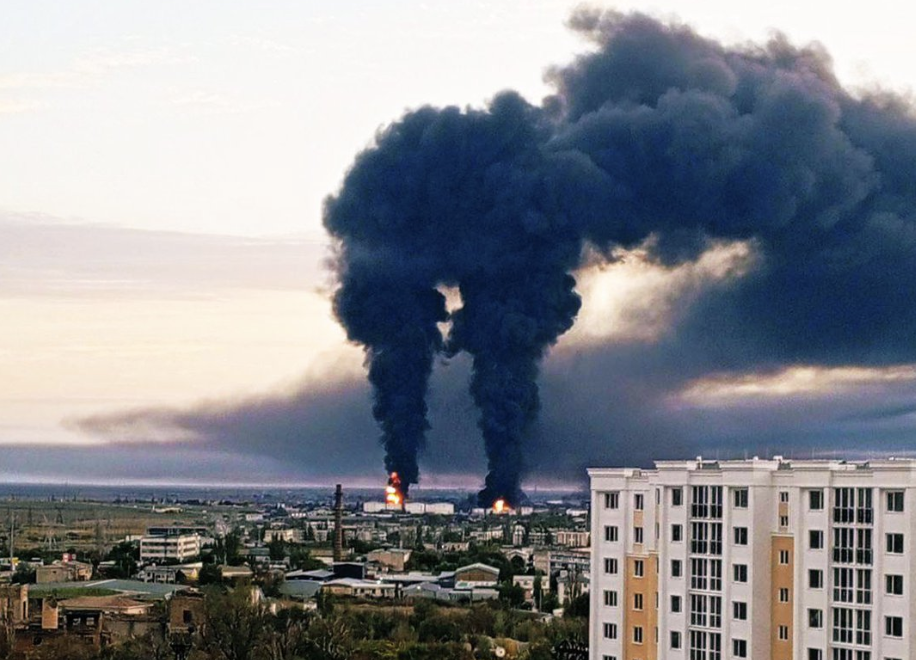 A screenshot from a video circulating online showing the aftermath of a Ukrainian strike on an oil terminal at Feodosia, eastern Crimea. Via X
A screenshot from a video circulating online showing the aftermath of a Ukrainian strike on an oil terminal at Feodosia, eastern Crimea. Via X“Ukraine should categorically reject any — even hypothetical — proposals for territorial concessions in exchange for peace,” the head of the Crimean Tatar exile government, or Majlis, Refat Chubarov, told Radio Liberty on Monday. “Because, in that case, there will be neither peace nor a Ukrainian state.”
A pro-Ukrainian partisan group active in Crimea, Atesh, posted Monday on its Telegram channel that Russia has “begun moving equipment and air defense systems en masse throughout the Crimean peninsula.”
Under Ukraine’s constitution, any change to the national territory has to be approved by a national referendum. Given that Crimea is a third rail in Ukrainian politics, no leader, including Mr. Zelensky, can risk agreeing to Russian control.
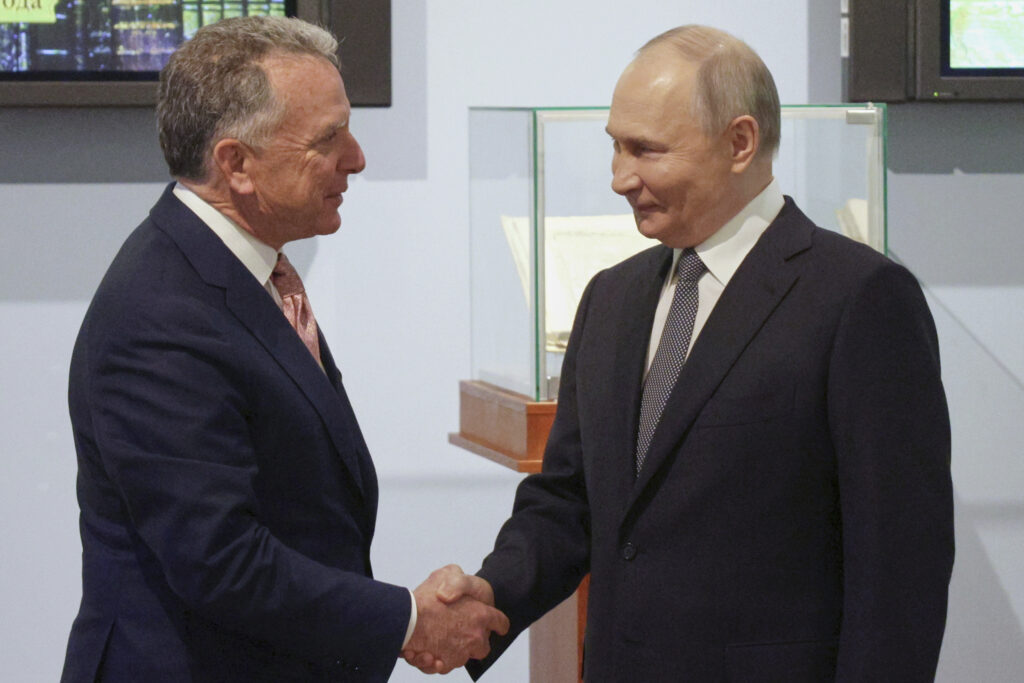 President Putin, right, and President Trump’s special envoy Steve Witkoff at St. Petersburg, April 11, 2025. Gavriil Grigorov, Sputnik, Kremlin pool via AP
President Putin, right, and President Trump’s special envoy Steve Witkoff at St. Petersburg, April 11, 2025. Gavriil Grigorov, Sputnik, Kremlin pool via AP“We will never recognize the occupation of Crimea,” Ukraine’s deputy prime minister, Yulia Svyrydenko, posted yesterday on X. “Ukraine is ready to negotiate — but not to surrender. There will be no agreement that hands Russia the stronger foundations it needs to regroup and return with greater violence.”
About 100 nations, including the United States, do not recognize Russian control over Crimea. Many analysts suggest a Korean-style path forward. Russia and Ukraine would agree to disagree, and the ownership question would be kicked down the road.
In an ominous sign for Ukraine, Mr. Trump’s envoy Steve Witkoff skipped a meeting on Wednesday at London with Ukrainian and British officials. Today, he flies to Moscow for his fourth one-on-one meeting with Mr. Putin. With Crimea’s status at stake, many Ukrainians feel they are falling victim to a diplomatic adage: “If you are not at the table, then you are on the menu.”
🧠 Pro Tip
Skip the extension — just come straight here.
We’ve built a fast, permanent tool you can bookmark and use anytime.
Go To Paywall Unblock ToolSave articles to reading lists
and access them on any device
If you found this app useful,
Please consider supporting us.
Thank you!